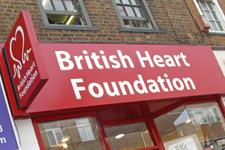Up to 300 jobs could be at risk at the British Heart Foundation, which expects to lose half of its expected income this year as a result of the coronavirus crisis, the charity announced today.
The charity said it would be consulting staff on cost-saving measures, describing the fall in income prompted by the closure of its 750 shops and cancellation of most fundraising events during lockdown as “devastating”.
In a statement, the BHF said it was committed to honouring its existing research programme, but repeated a previous warning that the sudden fall in income will force it to cut support for new research by about £50m this year – half its previous annual spend.
And, the BHF said, it could take “many years” for its funding to return to pre-pandemic levels.
The charity, which had an income of £338m in the year to 31 March 2019, said it had taken numerous steps to mitigate the cost of the crisis, including launching new fundraising appeals, furloughing staff, negotiating with landlords and suppliers to reduce costs, cancelling pay rises and freezing recruitment. However, the measures had not been enough to combat the income drop.
The consultation with staff is likely to take several months, the charity said.
Dr Charmaine Griffiths, the charity’s chief executive, said: “The coronavirus crisis is the single biggest challenge we’ve faced in our 60-year history and, despite the tireless commitment of our BHF team and supporters, threatens our life-saving work for the coming years.”
She said the financial shockwaves from the crisis would be profound, and would threaten scientific progress on heart disease.
“We have left no stone unturned in finding new ways of generating income and reducing costs but, unfortunately, we must consider reducing our activities and the size of our workforce as we chart our recovery,” she said.
“This has been an incredibly difficult decision and it will be even harder for those people who may leave our BHF team.
“We deeply regret the impact this may have on those colleagues who are affected and will explore every avenue to minimise the number of job losses, including through the re-allocation of roles within the organisation.”
At the peak of the pandemic, calls to the charity’s helpline increased by 400 per cent, and many BHF-funded researchers are now looking at ways to diagnose the heart problems caused by coronavirus.
Griffiths joined calls for the government to support medical research charities through the crisis through the proposed Life Sciences Charity Partnership Fund which would match charity-funded research over the next three years.
She warned that “the stakes are far higher than the future of any individual charity” and that “ failing to make this investment could be hugely damaging to the future health of the nation”.
